Analyzing Saudi Arabia's Vision 2030: A Knowledge Economy Case
VerifiedAdded on 2023/04/24
|10
|2792
|133
Case Study
AI Summary
This paper provides a comprehensive analysis of the knowledge-based economy, highlighting its benefits such as increased productivity, improved product quality, and enhanced innovation. It uses Saudi Arabia as a case study to illustrate the global shift from traditional economies to knowledge-based economies. Unlike many countries motivated by the general advantages of a knowledge-based economy, Saudi Arabia's transition is primarily driven by the need to address specific challenges, including unemployment and the oil crisis. The study explores the measures and future plans outlined in Saudi Arabia's Vision 2030, which focuses on technological development, education, training, and research to mitigate these economic problems and transform the nation into a knowledge-driven economy. The paper concludes by emphasizing the importance of this shift for Saudi Arabia's long-term economic stability and growth.
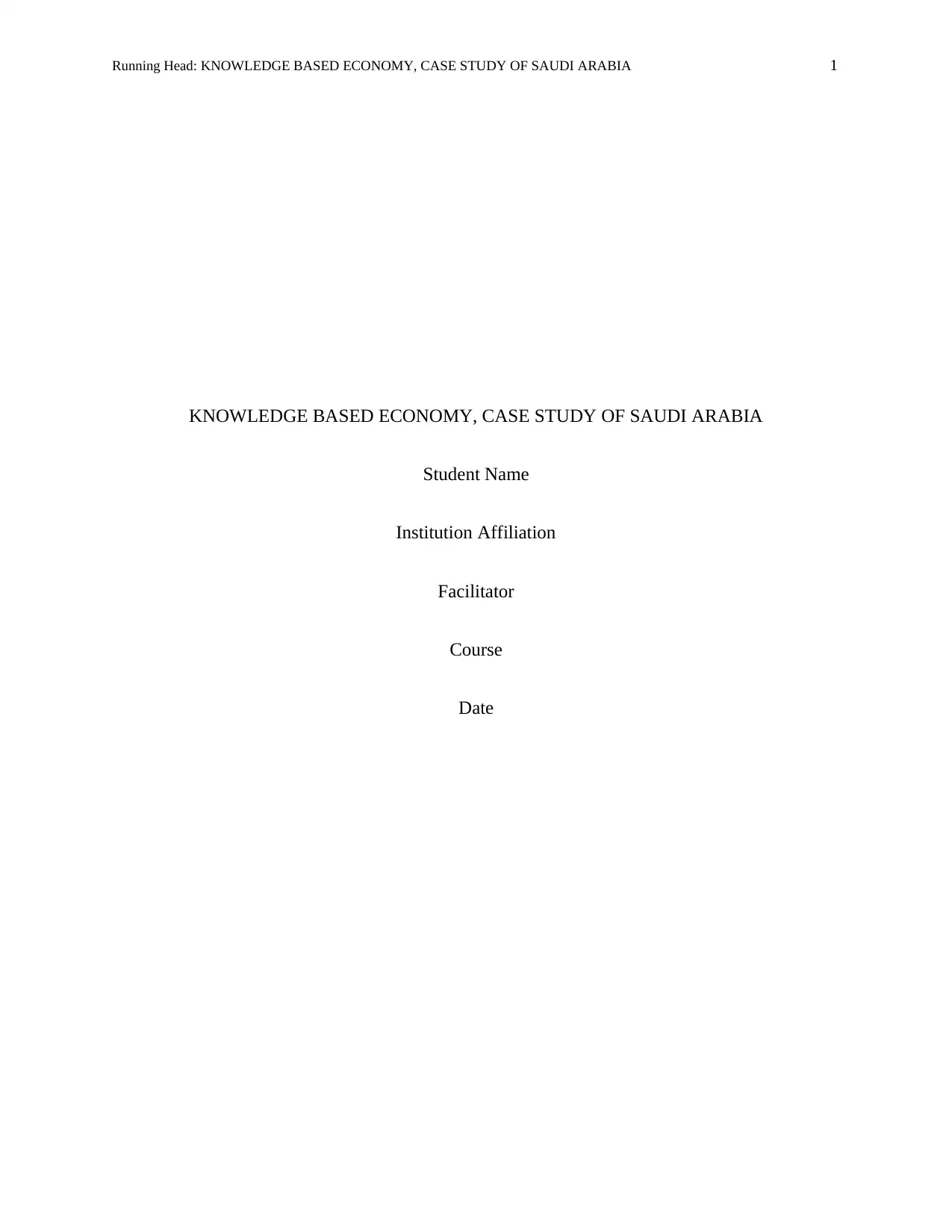
Running Head: KNOWLEDGE BASED ECONOMY, CASE STUDY OF SAUDI ARABIA 1
KNOWLEDGE BASED ECONOMY, CASE STUDY OF SAUDI ARABIA
Student Name
Institution Affiliation
Facilitator
Course
Date
KNOWLEDGE BASED ECONOMY, CASE STUDY OF SAUDI ARABIA
Student Name
Institution Affiliation
Facilitator
Course
Date
Paraphrase This Document
Need a fresh take? Get an instant paraphrase of this document with our AI Paraphraser
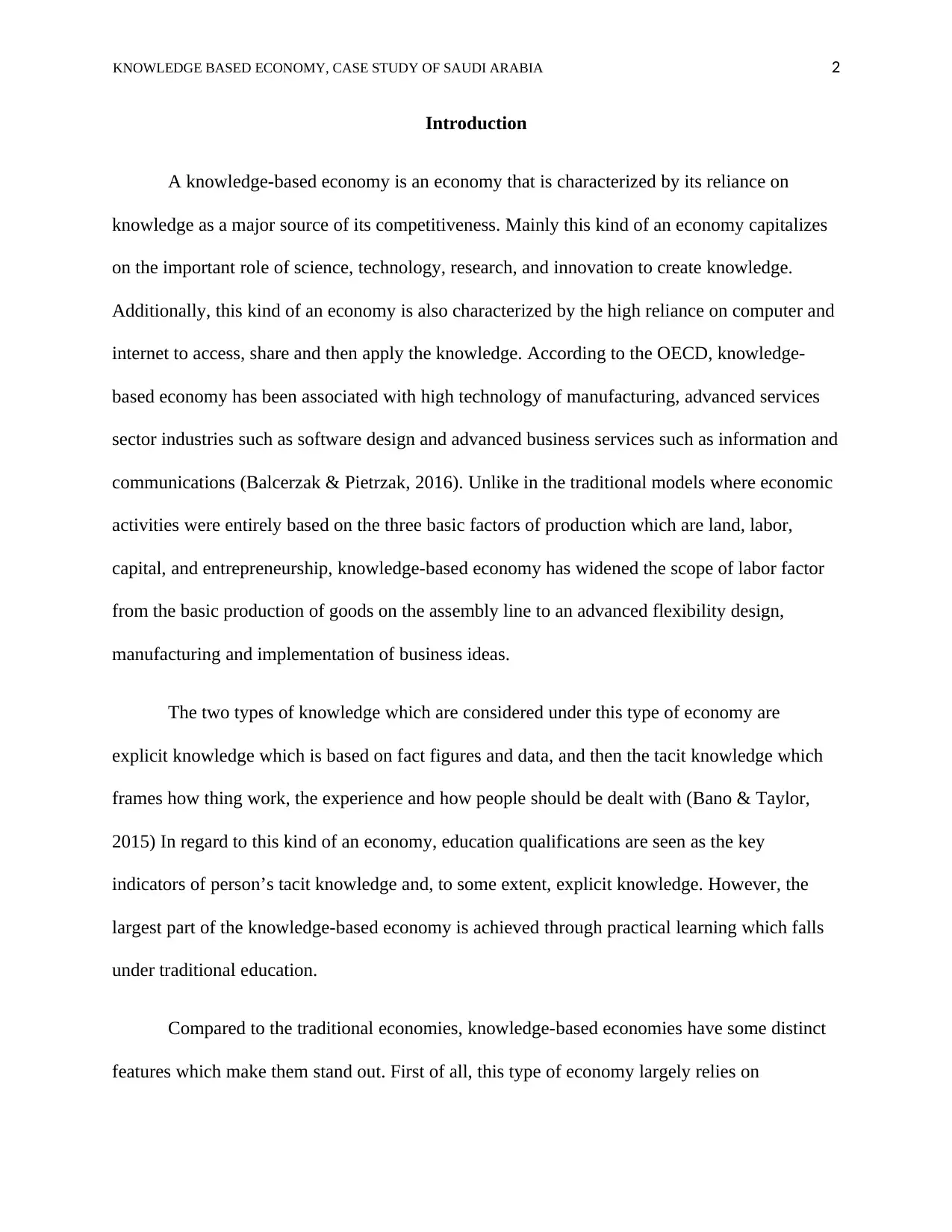
KNOWLEDGE BASED ECONOMY, CASE STUDY OF SAUDI ARABIA 2
Introduction
A knowledge-based economy is an economy that is characterized by its reliance on
knowledge as a major source of its competitiveness. Mainly this kind of an economy capitalizes
on the important role of science, technology, research, and innovation to create knowledge.
Additionally, this kind of an economy is also characterized by the high reliance on computer and
internet to access, share and then apply the knowledge. According to the OECD, knowledge-
based economy has been associated with high technology of manufacturing, advanced services
sector industries such as software design and advanced business services such as information and
communications (Balcerzak & Pietrzak, 2016). Unlike in the traditional models where economic
activities were entirely based on the three basic factors of production which are land, labor,
capital, and entrepreneurship, knowledge-based economy has widened the scope of labor factor
from the basic production of goods on the assembly line to an advanced flexibility design,
manufacturing and implementation of business ideas.
The two types of knowledge which are considered under this type of economy are
explicit knowledge which is based on fact figures and data, and then the tacit knowledge which
frames how thing work, the experience and how people should be dealt with (Bano & Taylor,
2015) In regard to this kind of an economy, education qualifications are seen as the key
indicators of person’s tacit knowledge and, to some extent, explicit knowledge. However, the
largest part of the knowledge-based economy is achieved through practical learning which falls
under traditional education.
Compared to the traditional economies, knowledge-based economies have some distinct
features which make them stand out. First of all, this type of economy largely relies on
Introduction
A knowledge-based economy is an economy that is characterized by its reliance on
knowledge as a major source of its competitiveness. Mainly this kind of an economy capitalizes
on the important role of science, technology, research, and innovation to create knowledge.
Additionally, this kind of an economy is also characterized by the high reliance on computer and
internet to access, share and then apply the knowledge. According to the OECD, knowledge-
based economy has been associated with high technology of manufacturing, advanced services
sector industries such as software design and advanced business services such as information and
communications (Balcerzak & Pietrzak, 2016). Unlike in the traditional models where economic
activities were entirely based on the three basic factors of production which are land, labor,
capital, and entrepreneurship, knowledge-based economy has widened the scope of labor factor
from the basic production of goods on the assembly line to an advanced flexibility design,
manufacturing and implementation of business ideas.
The two types of knowledge which are considered under this type of economy are
explicit knowledge which is based on fact figures and data, and then the tacit knowledge which
frames how thing work, the experience and how people should be dealt with (Bano & Taylor,
2015) In regard to this kind of an economy, education qualifications are seen as the key
indicators of person’s tacit knowledge and, to some extent, explicit knowledge. However, the
largest part of the knowledge-based economy is achieved through practical learning which falls
under traditional education.
Compared to the traditional economies, knowledge-based economies have some distinct
features which make them stand out. First of all, this type of economy largely relies on
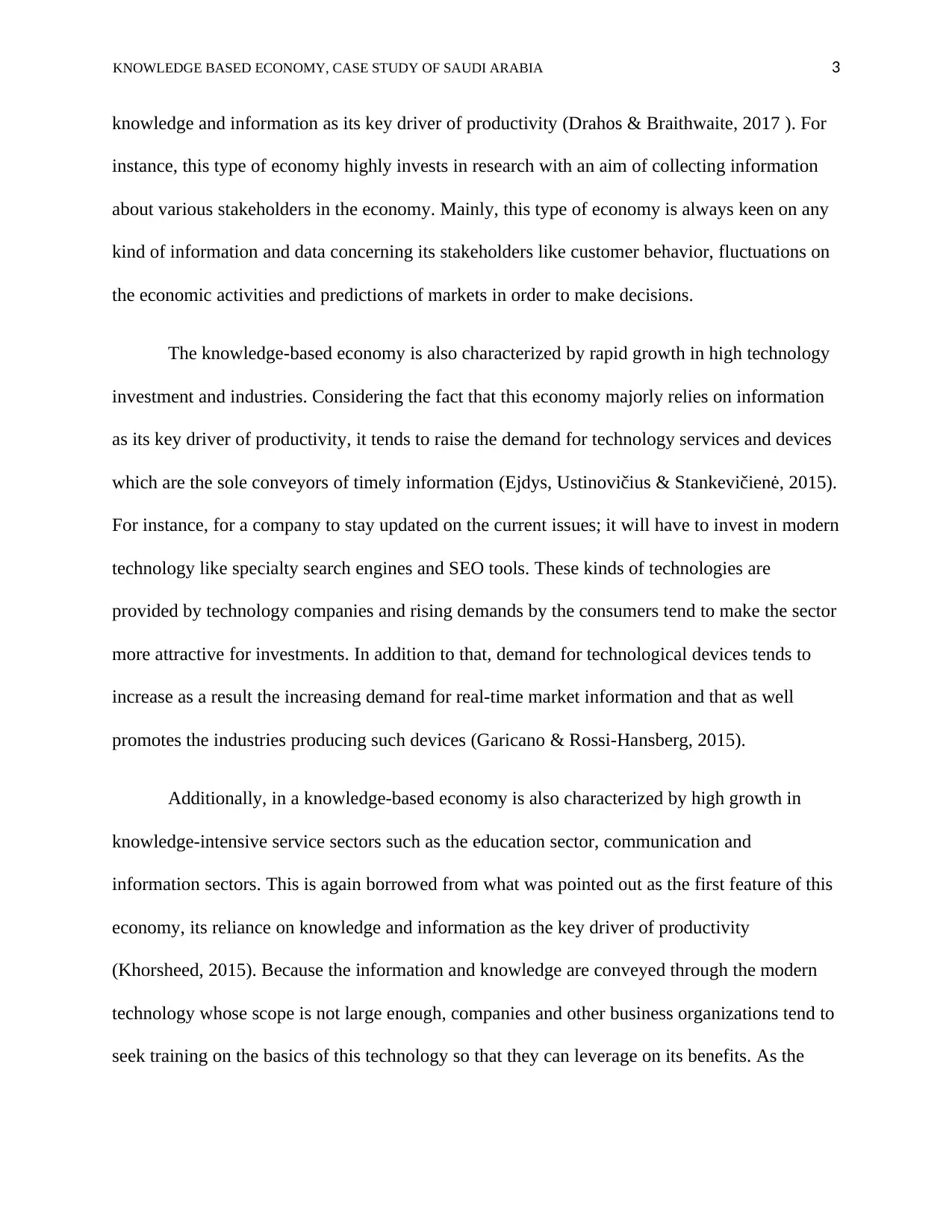
KNOWLEDGE BASED ECONOMY, CASE STUDY OF SAUDI ARABIA 3
knowledge and information as its key driver of productivity (Drahos & Braithwaite, 2017 ). For
instance, this type of economy highly invests in research with an aim of collecting information
about various stakeholders in the economy. Mainly, this type of economy is always keen on any
kind of information and data concerning its stakeholders like customer behavior, fluctuations on
the economic activities and predictions of markets in order to make decisions.
The knowledge-based economy is also characterized by rapid growth in high technology
investment and industries. Considering the fact that this economy majorly relies on information
as its key driver of productivity, it tends to raise the demand for technology services and devices
which are the sole conveyors of timely information (Ejdys, Ustinovičius & Stankevičienė, 2015).
For instance, for a company to stay updated on the current issues; it will have to invest in modern
technology like specialty search engines and SEO tools. These kinds of technologies are
provided by technology companies and rising demands by the consumers tend to make the sector
more attractive for investments. In addition to that, demand for technological devices tends to
increase as a result the increasing demand for real-time market information and that as well
promotes the industries producing such devices (Garicano & Rossi-Hansberg, 2015).
Additionally, in a knowledge-based economy is also characterized by high growth in
knowledge-intensive service sectors such as the education sector, communication and
information sectors. This is again borrowed from what was pointed out as the first feature of this
economy, its reliance on knowledge and information as the key driver of productivity
(Khorsheed, 2015). Because the information and knowledge are conveyed through the modern
technology whose scope is not large enough, companies and other business organizations tend to
seek training on the basics of this technology so that they can leverage on its benefits. As the
knowledge and information as its key driver of productivity (Drahos & Braithwaite, 2017 ). For
instance, this type of economy highly invests in research with an aim of collecting information
about various stakeholders in the economy. Mainly, this type of economy is always keen on any
kind of information and data concerning its stakeholders like customer behavior, fluctuations on
the economic activities and predictions of markets in order to make decisions.
The knowledge-based economy is also characterized by rapid growth in high technology
investment and industries. Considering the fact that this economy majorly relies on information
as its key driver of productivity, it tends to raise the demand for technology services and devices
which are the sole conveyors of timely information (Ejdys, Ustinovičius & Stankevičienė, 2015).
For instance, for a company to stay updated on the current issues; it will have to invest in modern
technology like specialty search engines and SEO tools. These kinds of technologies are
provided by technology companies and rising demands by the consumers tend to make the sector
more attractive for investments. In addition to that, demand for technological devices tends to
increase as a result the increasing demand for real-time market information and that as well
promotes the industries producing such devices (Garicano & Rossi-Hansberg, 2015).
Additionally, in a knowledge-based economy is also characterized by high growth in
knowledge-intensive service sectors such as the education sector, communication and
information sectors. This is again borrowed from what was pointed out as the first feature of this
economy, its reliance on knowledge and information as the key driver of productivity
(Khorsheed, 2015). Because the information and knowledge are conveyed through the modern
technology whose scope is not large enough, companies and other business organizations tend to
seek training on the basics of this technology so that they can leverage on its benefits. As the
⊘ This is a preview!⊘
Do you want full access?
Subscribe today to unlock all pages.

Trusted by 1+ million students worldwide
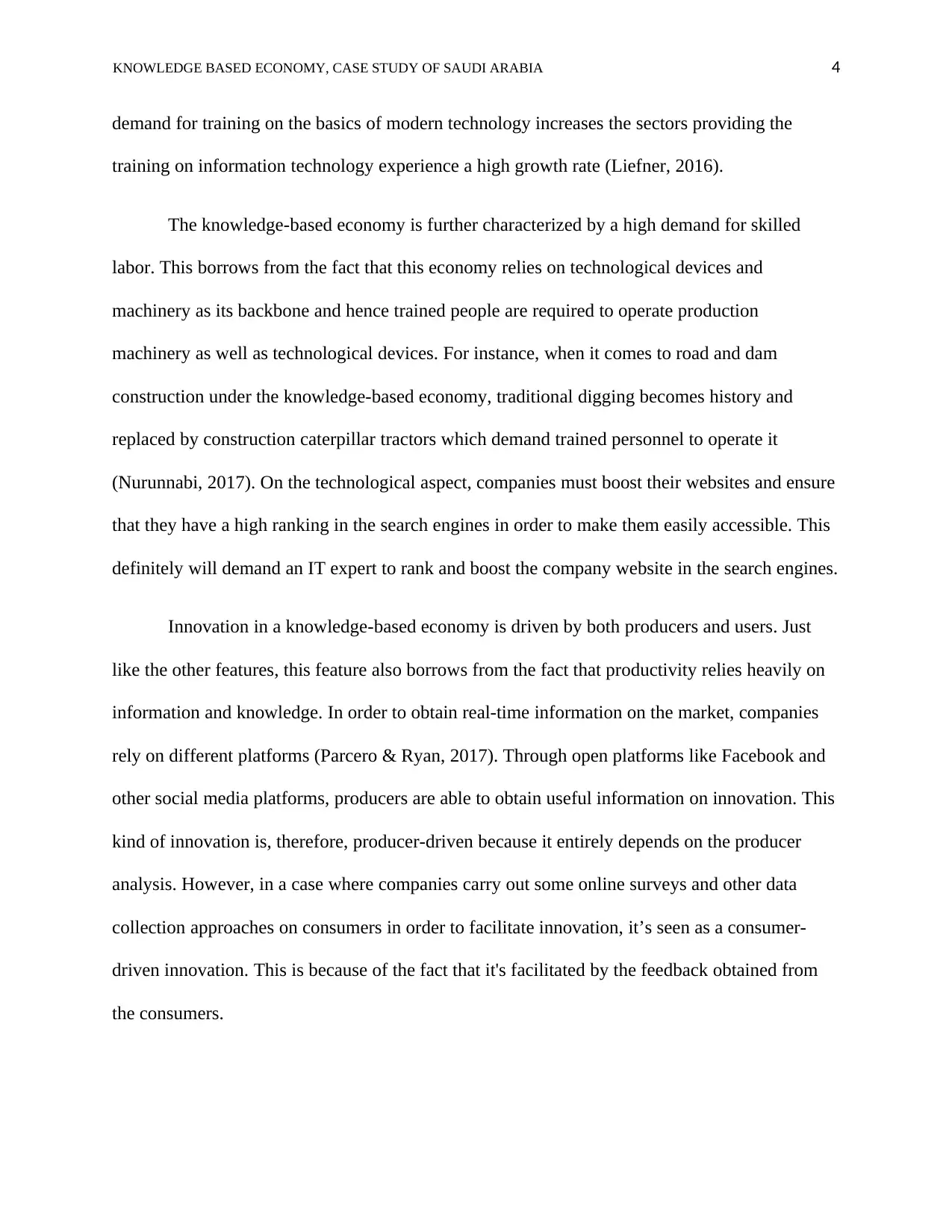
KNOWLEDGE BASED ECONOMY, CASE STUDY OF SAUDI ARABIA 4
demand for training on the basics of modern technology increases the sectors providing the
training on information technology experience a high growth rate (Liefner, 2016).
The knowledge-based economy is further characterized by a high demand for skilled
labor. This borrows from the fact that this economy relies on technological devices and
machinery as its backbone and hence trained people are required to operate production
machinery as well as technological devices. For instance, when it comes to road and dam
construction under the knowledge-based economy, traditional digging becomes history and
replaced by construction caterpillar tractors which demand trained personnel to operate it
(Nurunnabi, 2017). On the technological aspect, companies must boost their websites and ensure
that they have a high ranking in the search engines in order to make them easily accessible. This
definitely will demand an IT expert to rank and boost the company website in the search engines.
Innovation in a knowledge-based economy is driven by both producers and users. Just
like the other features, this feature also borrows from the fact that productivity relies heavily on
information and knowledge. In order to obtain real-time information on the market, companies
rely on different platforms (Parcero & Ryan, 2017). Through open platforms like Facebook and
other social media platforms, producers are able to obtain useful information on innovation. This
kind of innovation is, therefore, producer-driven because it entirely depends on the producer
analysis. However, in a case where companies carry out some online surveys and other data
collection approaches on consumers in order to facilitate innovation, it’s seen as a consumer-
driven innovation. This is because of the fact that it's facilitated by the feedback obtained from
the consumers.
demand for training on the basics of modern technology increases the sectors providing the
training on information technology experience a high growth rate (Liefner, 2016).
The knowledge-based economy is further characterized by a high demand for skilled
labor. This borrows from the fact that this economy relies on technological devices and
machinery as its backbone and hence trained people are required to operate production
machinery as well as technological devices. For instance, when it comes to road and dam
construction under the knowledge-based economy, traditional digging becomes history and
replaced by construction caterpillar tractors which demand trained personnel to operate it
(Nurunnabi, 2017). On the technological aspect, companies must boost their websites and ensure
that they have a high ranking in the search engines in order to make them easily accessible. This
definitely will demand an IT expert to rank and boost the company website in the search engines.
Innovation in a knowledge-based economy is driven by both producers and users. Just
like the other features, this feature also borrows from the fact that productivity relies heavily on
information and knowledge. In order to obtain real-time information on the market, companies
rely on different platforms (Parcero & Ryan, 2017). Through open platforms like Facebook and
other social media platforms, producers are able to obtain useful information on innovation. This
kind of innovation is, therefore, producer-driven because it entirely depends on the producer
analysis. However, in a case where companies carry out some online surveys and other data
collection approaches on consumers in order to facilitate innovation, it’s seen as a consumer-
driven innovation. This is because of the fact that it's facilitated by the feedback obtained from
the consumers.
Paraphrase This Document
Need a fresh take? Get an instant paraphrase of this document with our AI Paraphraser
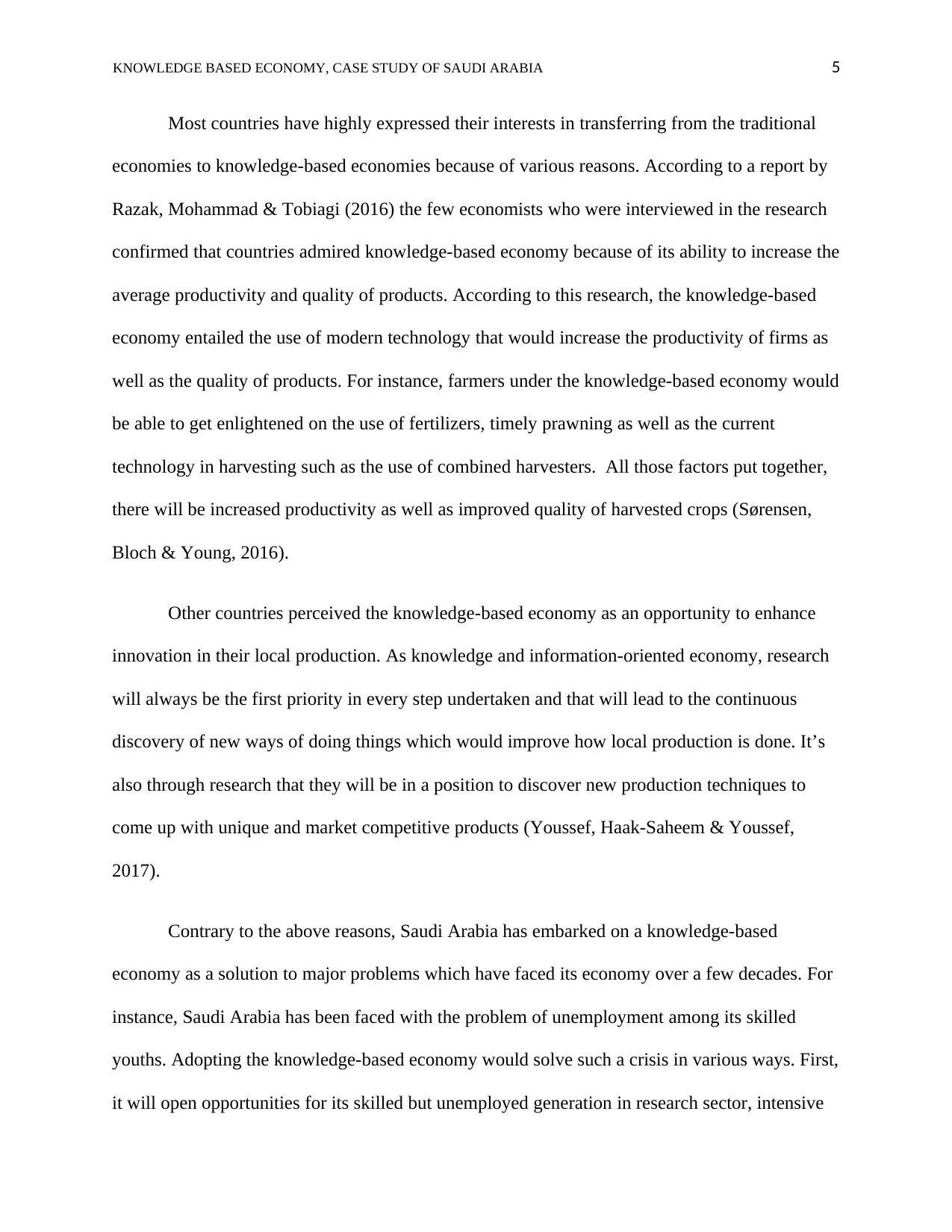
KNOWLEDGE BASED ECONOMY, CASE STUDY OF SAUDI ARABIA 5
Most countries have highly expressed their interests in transferring from the traditional
economies to knowledge-based economies because of various reasons. According to a report by
Razak, Mohammad & Tobiagi (2016) the few economists who were interviewed in the research
confirmed that countries admired knowledge-based economy because of its ability to increase the
average productivity and quality of products. According to this research, the knowledge-based
economy entailed the use of modern technology that would increase the productivity of firms as
well as the quality of products. For instance, farmers under the knowledge-based economy would
be able to get enlightened on the use of fertilizers, timely prawning as well as the current
technology in harvesting such as the use of combined harvesters. All those factors put together,
there will be increased productivity as well as improved quality of harvested crops (Sørensen,
Bloch & Young, 2016).
Other countries perceived the knowledge-based economy as an opportunity to enhance
innovation in their local production. As knowledge and information-oriented economy, research
will always be the first priority in every step undertaken and that will lead to the continuous
discovery of new ways of doing things which would improve how local production is done. It’s
also through research that they will be in a position to discover new production techniques to
come up with unique and market competitive products (Youssef, Haak-Saheem & Youssef,
2017).
Contrary to the above reasons, Saudi Arabia has embarked on a knowledge-based
economy as a solution to major problems which have faced its economy over a few decades. For
instance, Saudi Arabia has been faced with the problem of unemployment among its skilled
youths. Adopting the knowledge-based economy would solve such a crisis in various ways. First,
it will open opportunities for its skilled but unemployed generation in research sector, intensive
Most countries have highly expressed their interests in transferring from the traditional
economies to knowledge-based economies because of various reasons. According to a report by
Razak, Mohammad & Tobiagi (2016) the few economists who were interviewed in the research
confirmed that countries admired knowledge-based economy because of its ability to increase the
average productivity and quality of products. According to this research, the knowledge-based
economy entailed the use of modern technology that would increase the productivity of firms as
well as the quality of products. For instance, farmers under the knowledge-based economy would
be able to get enlightened on the use of fertilizers, timely prawning as well as the current
technology in harvesting such as the use of combined harvesters. All those factors put together,
there will be increased productivity as well as improved quality of harvested crops (Sørensen,
Bloch & Young, 2016).
Other countries perceived the knowledge-based economy as an opportunity to enhance
innovation in their local production. As knowledge and information-oriented economy, research
will always be the first priority in every step undertaken and that will lead to the continuous
discovery of new ways of doing things which would improve how local production is done. It’s
also through research that they will be in a position to discover new production techniques to
come up with unique and market competitive products (Youssef, Haak-Saheem & Youssef,
2017).
Contrary to the above reasons, Saudi Arabia has embarked on a knowledge-based
economy as a solution to major problems which have faced its economy over a few decades. For
instance, Saudi Arabia has been faced with the problem of unemployment among its skilled
youths. Adopting the knowledge-based economy would solve such a crisis in various ways. First,
it will open opportunities for its skilled but unemployed generation in research sector, intensive
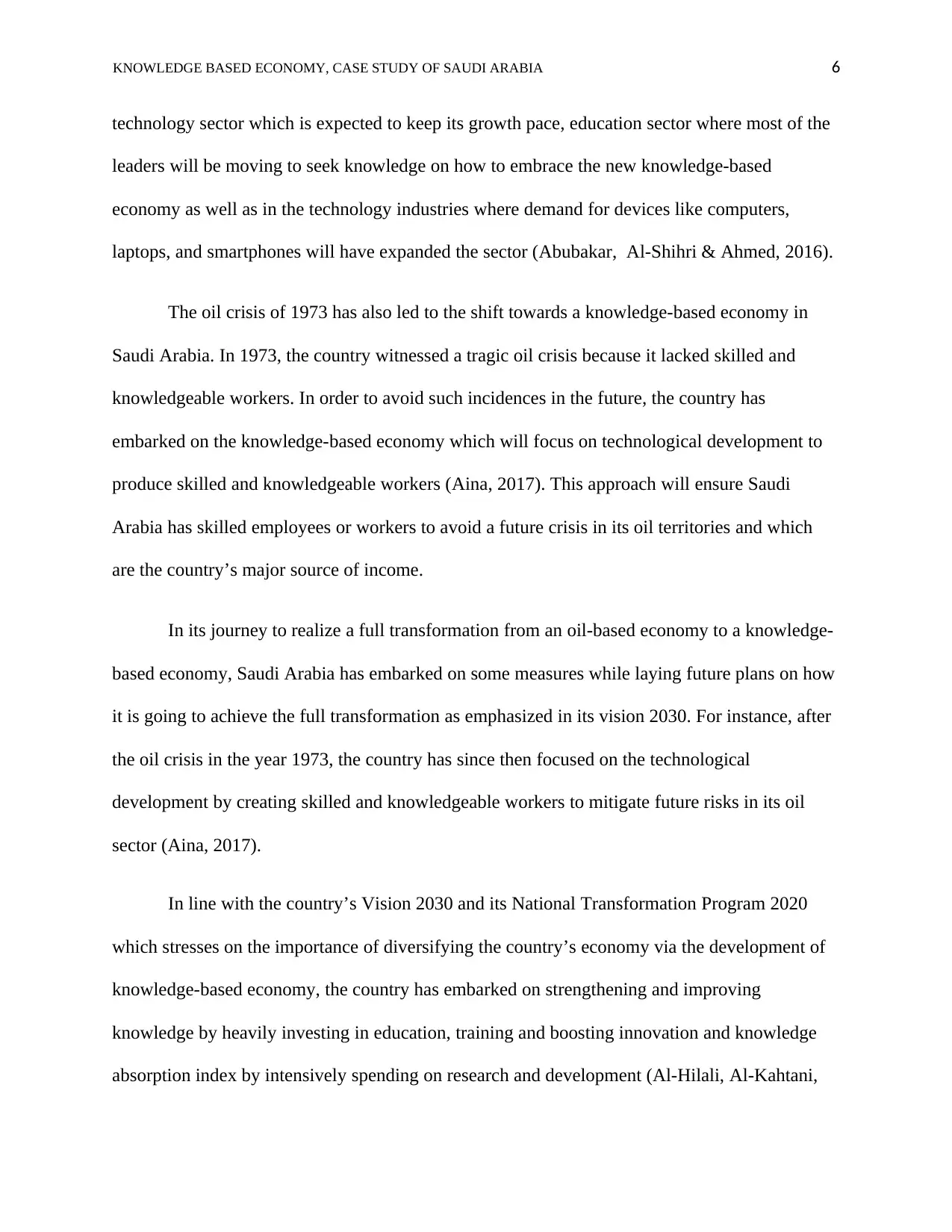
KNOWLEDGE BASED ECONOMY, CASE STUDY OF SAUDI ARABIA 6
technology sector which is expected to keep its growth pace, education sector where most of the
leaders will be moving to seek knowledge on how to embrace the new knowledge-based
economy as well as in the technology industries where demand for devices like computers,
laptops, and smartphones will have expanded the sector (Abubakar, Al-Shihri & Ahmed, 2016).
The oil crisis of 1973 has also led to the shift towards a knowledge-based economy in
Saudi Arabia. In 1973, the country witnessed a tragic oil crisis because it lacked skilled and
knowledgeable workers. In order to avoid such incidences in the future, the country has
embarked on the knowledge-based economy which will focus on technological development to
produce skilled and knowledgeable workers (Aina, 2017). This approach will ensure Saudi
Arabia has skilled employees or workers to avoid a future crisis in its oil territories and which
are the country’s major source of income.
In its journey to realize a full transformation from an oil-based economy to a knowledge-
based economy, Saudi Arabia has embarked on some measures while laying future plans on how
it is going to achieve the full transformation as emphasized in its vision 2030. For instance, after
the oil crisis in the year 1973, the country has since then focused on the technological
development by creating skilled and knowledgeable workers to mitigate future risks in its oil
sector (Aina, 2017).
In line with the country’s Vision 2030 and its National Transformation Program 2020
which stresses on the importance of diversifying the country’s economy via the development of
knowledge-based economy, the country has embarked on strengthening and improving
knowledge by heavily investing in education, training and boosting innovation and knowledge
absorption index by intensively spending on research and development (Al-Hilali, Al-Kahtani,
technology sector which is expected to keep its growth pace, education sector where most of the
leaders will be moving to seek knowledge on how to embrace the new knowledge-based
economy as well as in the technology industries where demand for devices like computers,
laptops, and smartphones will have expanded the sector (Abubakar, Al-Shihri & Ahmed, 2016).
The oil crisis of 1973 has also led to the shift towards a knowledge-based economy in
Saudi Arabia. In 1973, the country witnessed a tragic oil crisis because it lacked skilled and
knowledgeable workers. In order to avoid such incidences in the future, the country has
embarked on the knowledge-based economy which will focus on technological development to
produce skilled and knowledgeable workers (Aina, 2017). This approach will ensure Saudi
Arabia has skilled employees or workers to avoid a future crisis in its oil territories and which
are the country’s major source of income.
In its journey to realize a full transformation from an oil-based economy to a knowledge-
based economy, Saudi Arabia has embarked on some measures while laying future plans on how
it is going to achieve the full transformation as emphasized in its vision 2030. For instance, after
the oil crisis in the year 1973, the country has since then focused on the technological
development by creating skilled and knowledgeable workers to mitigate future risks in its oil
sector (Aina, 2017).
In line with the country’s Vision 2030 and its National Transformation Program 2020
which stresses on the importance of diversifying the country’s economy via the development of
knowledge-based economy, the country has embarked on strengthening and improving
knowledge by heavily investing in education, training and boosting innovation and knowledge
absorption index by intensively spending on research and development (Al-Hilali, Al-Kahtani,
⊘ This is a preview!⊘
Do you want full access?
Subscribe today to unlock all pages.

Trusted by 1+ million students worldwide
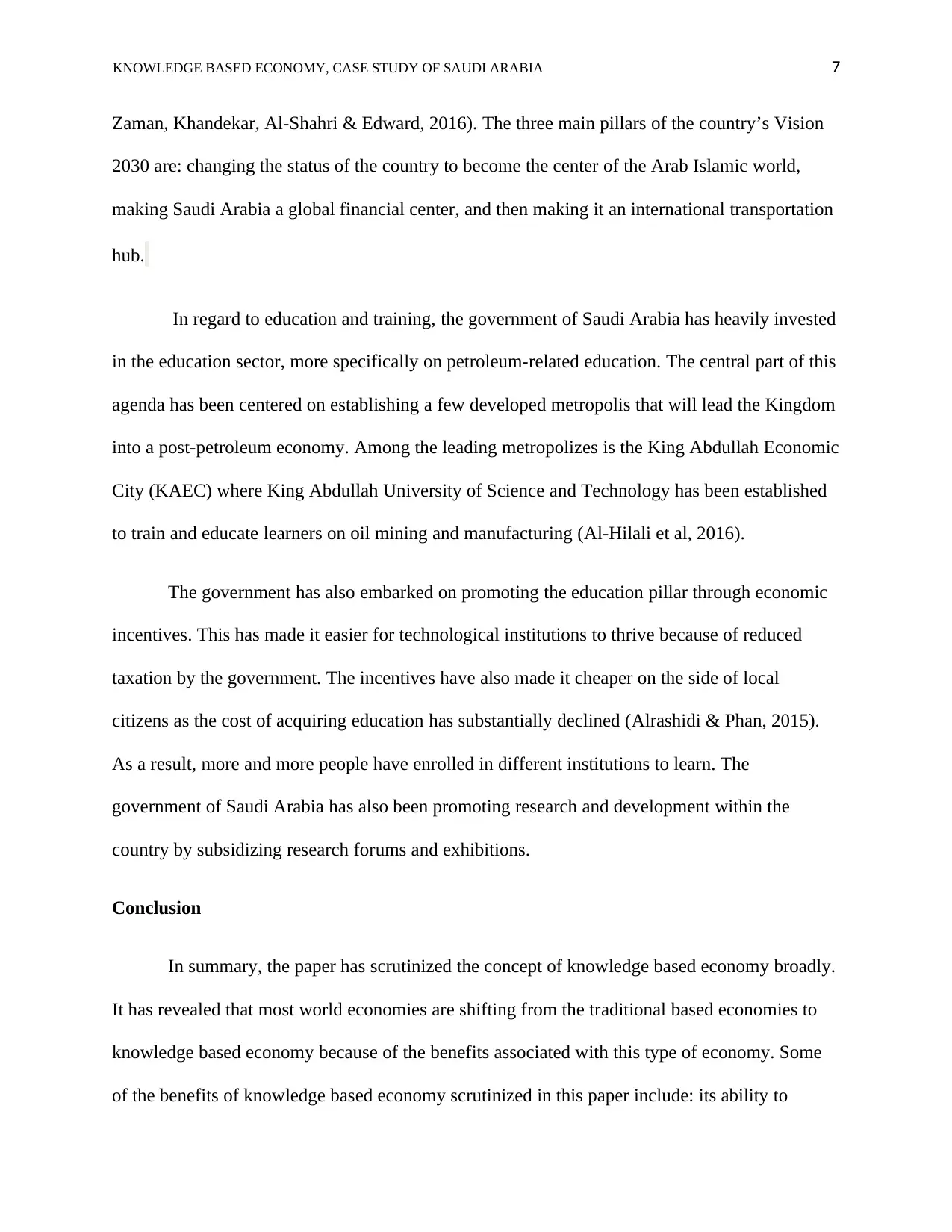
KNOWLEDGE BASED ECONOMY, CASE STUDY OF SAUDI ARABIA 7
Zaman, Khandekar, Al-Shahri & Edward, 2016). The three main pillars of the country’s Vision
2030 are: changing the status of the country to become the center of the Arab Islamic world,
making Saudi Arabia a global financial center, and then making it an international transportation
hub.
In regard to education and training, the government of Saudi Arabia has heavily invested
in the education sector, more specifically on petroleum-related education. The central part of this
agenda has been centered on establishing a few developed metropolis that will lead the Kingdom
into a post-petroleum economy. Among the leading metropolizes is the King Abdullah Economic
City (KAEC) where King Abdullah University of Science and Technology has been established
to train and educate learners on oil mining and manufacturing (Al-Hilali et al, 2016).
The government has also embarked on promoting the education pillar through economic
incentives. This has made it easier for technological institutions to thrive because of reduced
taxation by the government. The incentives have also made it cheaper on the side of local
citizens as the cost of acquiring education has substantially declined (Alrashidi & Phan, 2015).
As a result, more and more people have enrolled in different institutions to learn. The
government of Saudi Arabia has also been promoting research and development within the
country by subsidizing research forums and exhibitions.
Conclusion
In summary, the paper has scrutinized the concept of knowledge based economy broadly.
It has revealed that most world economies are shifting from the traditional based economies to
knowledge based economy because of the benefits associated with this type of economy. Some
of the benefits of knowledge based economy scrutinized in this paper include: its ability to
Zaman, Khandekar, Al-Shahri & Edward, 2016). The three main pillars of the country’s Vision
2030 are: changing the status of the country to become the center of the Arab Islamic world,
making Saudi Arabia a global financial center, and then making it an international transportation
hub.
In regard to education and training, the government of Saudi Arabia has heavily invested
in the education sector, more specifically on petroleum-related education. The central part of this
agenda has been centered on establishing a few developed metropolis that will lead the Kingdom
into a post-petroleum economy. Among the leading metropolizes is the King Abdullah Economic
City (KAEC) where King Abdullah University of Science and Technology has been established
to train and educate learners on oil mining and manufacturing (Al-Hilali et al, 2016).
The government has also embarked on promoting the education pillar through economic
incentives. This has made it easier for technological institutions to thrive because of reduced
taxation by the government. The incentives have also made it cheaper on the side of local
citizens as the cost of acquiring education has substantially declined (Alrashidi & Phan, 2015).
As a result, more and more people have enrolled in different institutions to learn. The
government of Saudi Arabia has also been promoting research and development within the
country by subsidizing research forums and exhibitions.
Conclusion
In summary, the paper has scrutinized the concept of knowledge based economy broadly.
It has revealed that most world economies are shifting from the traditional based economies to
knowledge based economy because of the benefits associated with this type of economy. Some
of the benefits of knowledge based economy scrutinized in this paper include: its ability to
Paraphrase This Document
Need a fresh take? Get an instant paraphrase of this document with our AI Paraphraser
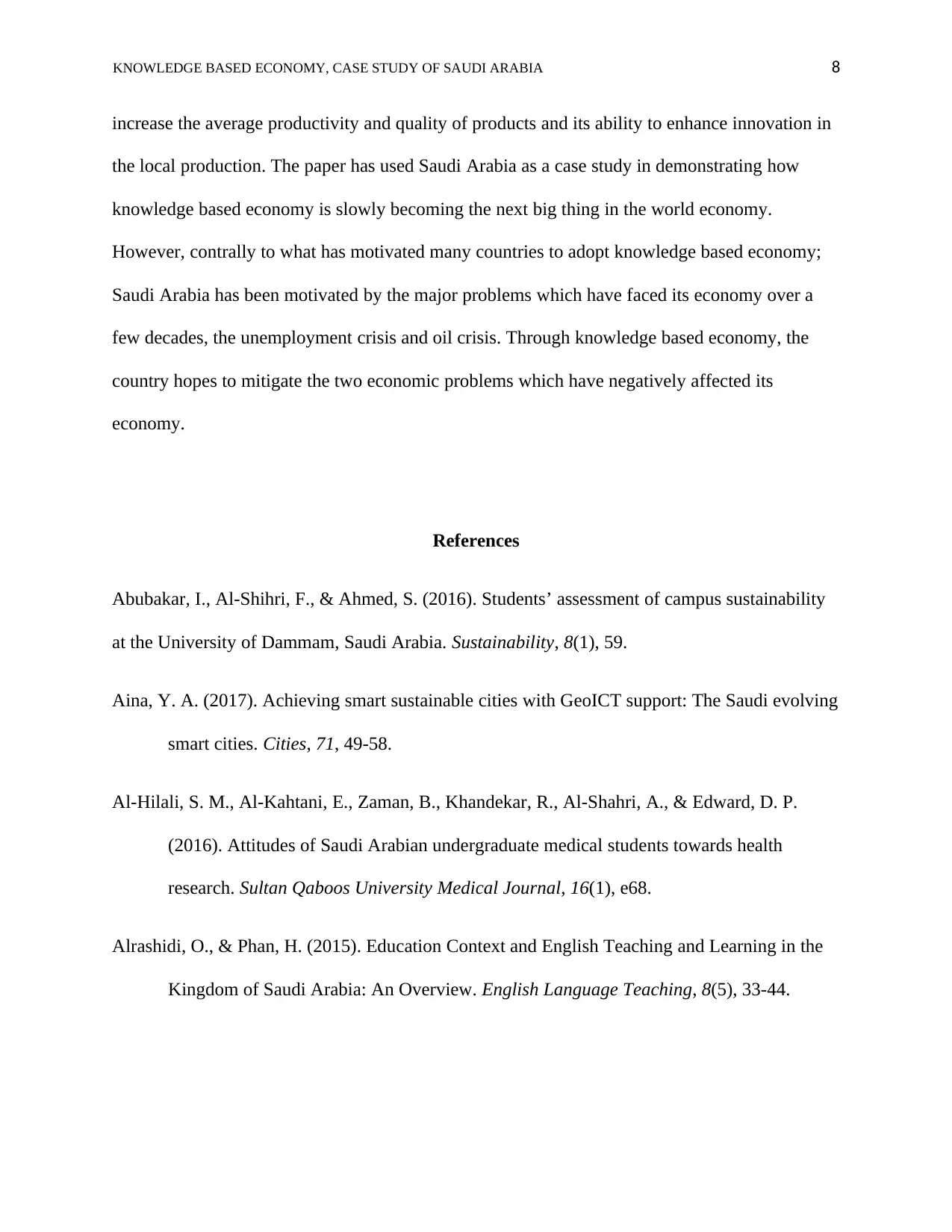
KNOWLEDGE BASED ECONOMY, CASE STUDY OF SAUDI ARABIA 8
increase the average productivity and quality of products and its ability to enhance innovation in
the local production. The paper has used Saudi Arabia as a case study in demonstrating how
knowledge based economy is slowly becoming the next big thing in the world economy.
However, contrally to what has motivated many countries to adopt knowledge based economy;
Saudi Arabia has been motivated by the major problems which have faced its economy over a
few decades, the unemployment crisis and oil crisis. Through knowledge based economy, the
country hopes to mitigate the two economic problems which have negatively affected its
economy.
References
Abubakar, I., Al-Shihri, F., & Ahmed, S. (2016). Students’ assessment of campus sustainability
at the University of Dammam, Saudi Arabia. Sustainability, 8(1), 59.
Aina, Y. A. (2017). Achieving smart sustainable cities with GeoICT support: The Saudi evolving
smart cities. Cities, 71, 49-58.
Al-Hilali, S. M., Al-Kahtani, E., Zaman, B., Khandekar, R., Al-Shahri, A., & Edward, D. P.
(2016). Attitudes of Saudi Arabian undergraduate medical students towards health
research. Sultan Qaboos University Medical Journal, 16(1), e68.
Alrashidi, O., & Phan, H. (2015). Education Context and English Teaching and Learning in the
Kingdom of Saudi Arabia: An Overview. English Language Teaching, 8(5), 33-44.
increase the average productivity and quality of products and its ability to enhance innovation in
the local production. The paper has used Saudi Arabia as a case study in demonstrating how
knowledge based economy is slowly becoming the next big thing in the world economy.
However, contrally to what has motivated many countries to adopt knowledge based economy;
Saudi Arabia has been motivated by the major problems which have faced its economy over a
few decades, the unemployment crisis and oil crisis. Through knowledge based economy, the
country hopes to mitigate the two economic problems which have negatively affected its
economy.
References
Abubakar, I., Al-Shihri, F., & Ahmed, S. (2016). Students’ assessment of campus sustainability
at the University of Dammam, Saudi Arabia. Sustainability, 8(1), 59.
Aina, Y. A. (2017). Achieving smart sustainable cities with GeoICT support: The Saudi evolving
smart cities. Cities, 71, 49-58.
Al-Hilali, S. M., Al-Kahtani, E., Zaman, B., Khandekar, R., Al-Shahri, A., & Edward, D. P.
(2016). Attitudes of Saudi Arabian undergraduate medical students towards health
research. Sultan Qaboos University Medical Journal, 16(1), e68.
Alrashidi, O., & Phan, H. (2015). Education Context and English Teaching and Learning in the
Kingdom of Saudi Arabia: An Overview. English Language Teaching, 8(5), 33-44.
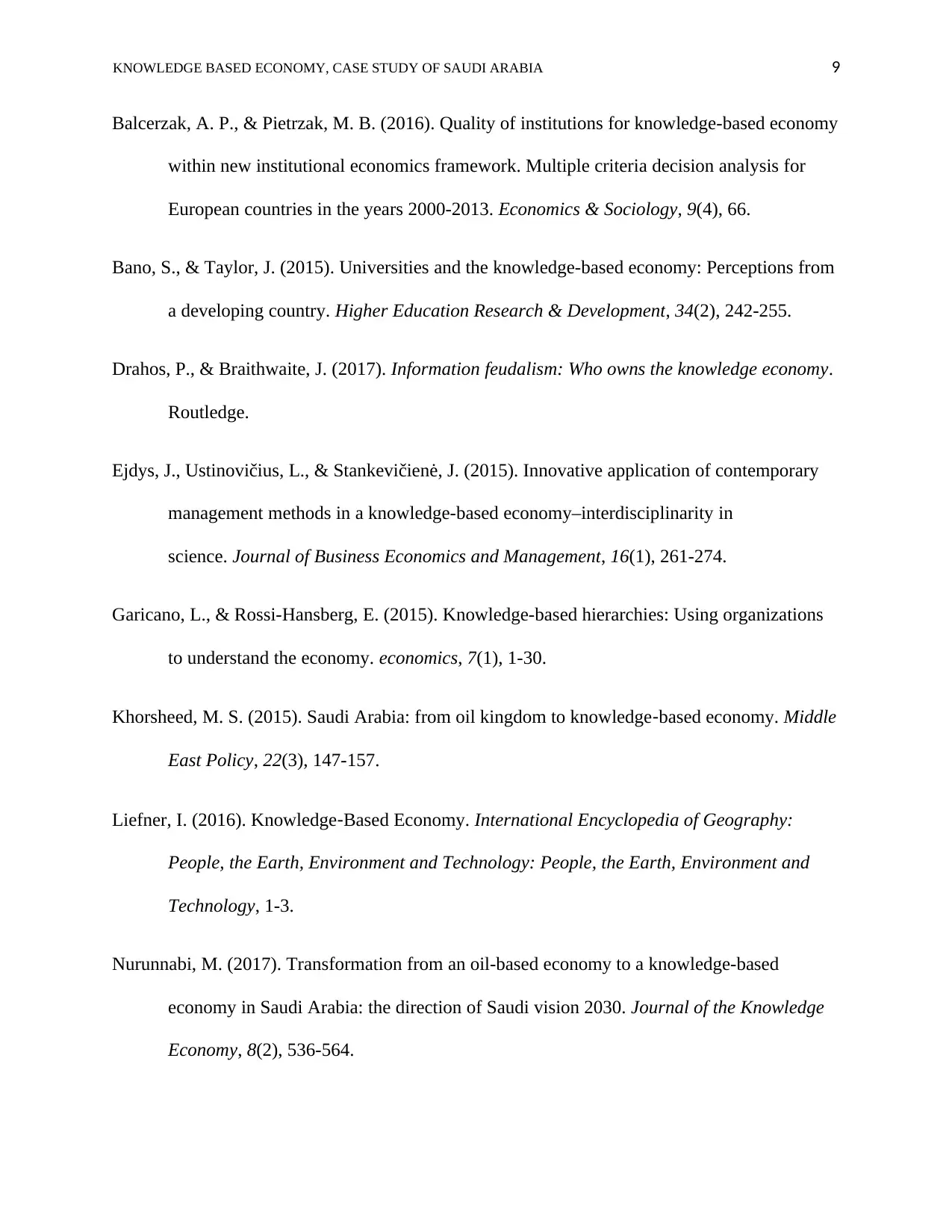
KNOWLEDGE BASED ECONOMY, CASE STUDY OF SAUDI ARABIA 9
Balcerzak, A. P., & Pietrzak, M. B. (2016). Quality of institutions for knowledge-based economy
within new institutional economics framework. Multiple criteria decision analysis for
European countries in the years 2000-2013. Economics & Sociology, 9(4), 66.
Bano, S., & Taylor, J. (2015). Universities and the knowledge-based economy: Perceptions from
a developing country. Higher Education Research & Development, 34(2), 242-255.
Drahos, P., & Braithwaite, J. (2017). Information feudalism: Who owns the knowledge economy.
Routledge.
Ejdys, J., Ustinovičius, L., & Stankevičienė, J. (2015). Innovative application of contemporary
management methods in a knowledge-based economy–interdisciplinarity in
science. Journal of Business Economics and Management, 16(1), 261-274.
Garicano, L., & Rossi-Hansberg, E. (2015). Knowledge-based hierarchies: Using organizations
to understand the economy. economics, 7(1), 1-30.
Khorsheed, M. S. (2015). Saudi Arabia: from oil kingdom to knowledge‐based economy. Middle
East Policy, 22(3), 147-157.
Liefner, I. (2016). Knowledge‐Based Economy. International Encyclopedia of Geography:
People, the Earth, Environment and Technology: People, the Earth, Environment and
Technology, 1-3.
Nurunnabi, M. (2017). Transformation from an oil-based economy to a knowledge-based
economy in Saudi Arabia: the direction of Saudi vision 2030. Journal of the Knowledge
Economy, 8(2), 536-564.
Balcerzak, A. P., & Pietrzak, M. B. (2016). Quality of institutions for knowledge-based economy
within new institutional economics framework. Multiple criteria decision analysis for
European countries in the years 2000-2013. Economics & Sociology, 9(4), 66.
Bano, S., & Taylor, J. (2015). Universities and the knowledge-based economy: Perceptions from
a developing country. Higher Education Research & Development, 34(2), 242-255.
Drahos, P., & Braithwaite, J. (2017). Information feudalism: Who owns the knowledge economy.
Routledge.
Ejdys, J., Ustinovičius, L., & Stankevičienė, J. (2015). Innovative application of contemporary
management methods in a knowledge-based economy–interdisciplinarity in
science. Journal of Business Economics and Management, 16(1), 261-274.
Garicano, L., & Rossi-Hansberg, E. (2015). Knowledge-based hierarchies: Using organizations
to understand the economy. economics, 7(1), 1-30.
Khorsheed, M. S. (2015). Saudi Arabia: from oil kingdom to knowledge‐based economy. Middle
East Policy, 22(3), 147-157.
Liefner, I. (2016). Knowledge‐Based Economy. International Encyclopedia of Geography:
People, the Earth, Environment and Technology: People, the Earth, Environment and
Technology, 1-3.
Nurunnabi, M. (2017). Transformation from an oil-based economy to a knowledge-based
economy in Saudi Arabia: the direction of Saudi vision 2030. Journal of the Knowledge
Economy, 8(2), 536-564.
⊘ This is a preview!⊘
Do you want full access?
Subscribe today to unlock all pages.

Trusted by 1+ million students worldwide
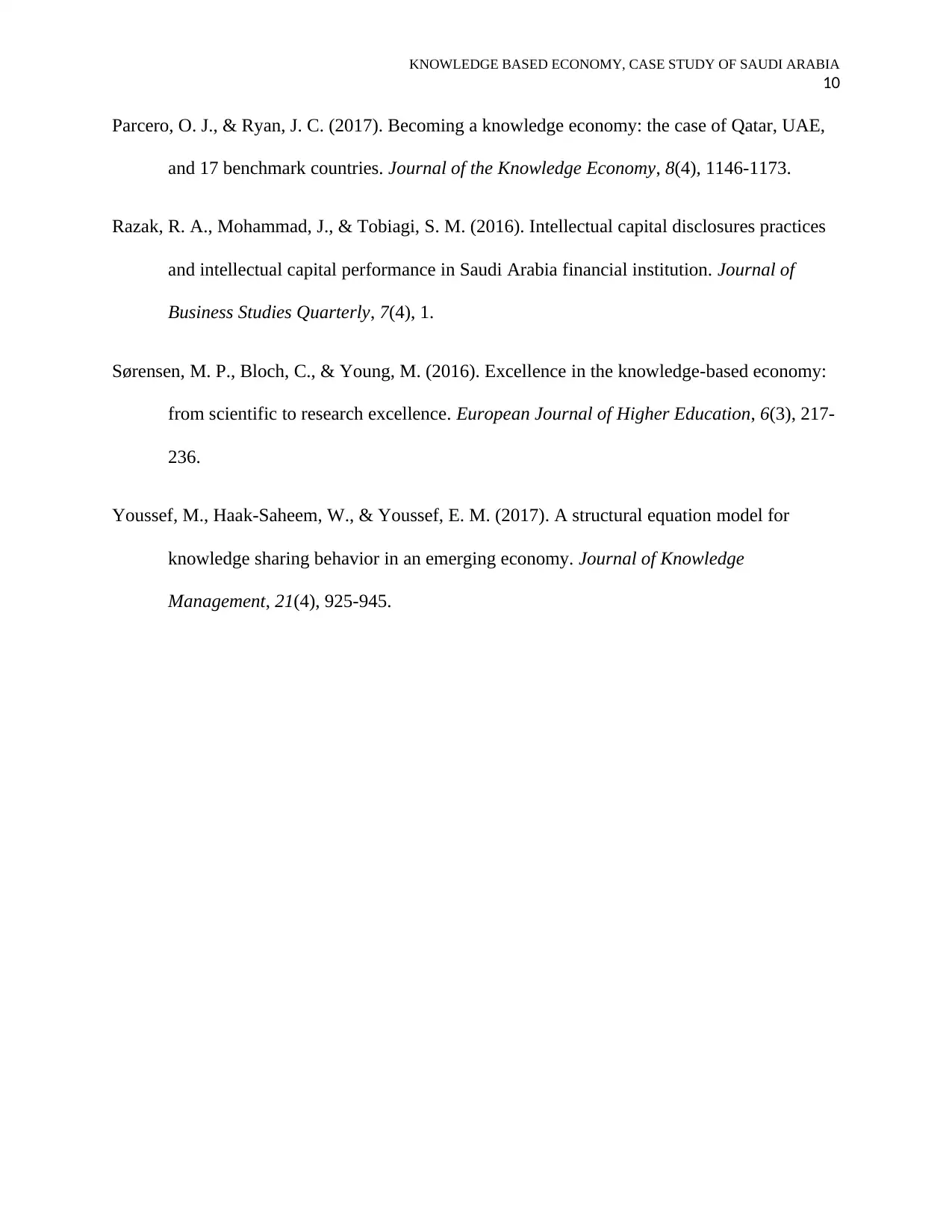
KNOWLEDGE BASED ECONOMY, CASE STUDY OF SAUDI ARABIA
10
Parcero, O. J., & Ryan, J. C. (2017). Becoming a knowledge economy: the case of Qatar, UAE,
and 17 benchmark countries. Journal of the Knowledge Economy, 8(4), 1146-1173.
Razak, R. A., Mohammad, J., & Tobiagi, S. M. (2016). Intellectual capital disclosures practices
and intellectual capital performance in Saudi Arabia financial institution. Journal of
Business Studies Quarterly, 7(4), 1.
Sørensen, M. P., Bloch, C., & Young, M. (2016). Excellence in the knowledge-based economy:
from scientific to research excellence. European Journal of Higher Education, 6(3), 217-
236.
Youssef, M., Haak-Saheem, W., & Youssef, E. M. (2017). A structural equation model for
knowledge sharing behavior in an emerging economy. Journal of Knowledge
Management, 21(4), 925-945.
10
Parcero, O. J., & Ryan, J. C. (2017). Becoming a knowledge economy: the case of Qatar, UAE,
and 17 benchmark countries. Journal of the Knowledge Economy, 8(4), 1146-1173.
Razak, R. A., Mohammad, J., & Tobiagi, S. M. (2016). Intellectual capital disclosures practices
and intellectual capital performance in Saudi Arabia financial institution. Journal of
Business Studies Quarterly, 7(4), 1.
Sørensen, M. P., Bloch, C., & Young, M. (2016). Excellence in the knowledge-based economy:
from scientific to research excellence. European Journal of Higher Education, 6(3), 217-
236.
Youssef, M., Haak-Saheem, W., & Youssef, E. M. (2017). A structural equation model for
knowledge sharing behavior in an emerging economy. Journal of Knowledge
Management, 21(4), 925-945.
1 out of 10
Related Documents
Your All-in-One AI-Powered Toolkit for Academic Success.
+13062052269
info@desklib.com
Available 24*7 on WhatsApp / Email
![[object Object]](/_next/static/media/star-bottom.7253800d.svg)
Unlock your academic potential
Copyright © 2020–2026 A2Z Services. All Rights Reserved. Developed and managed by ZUCOL.





